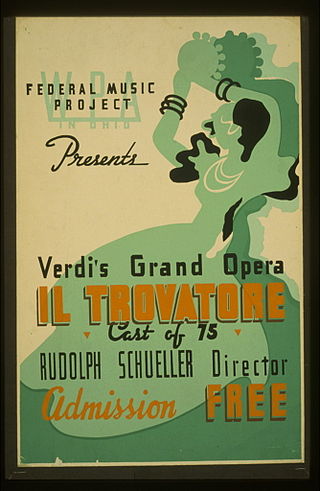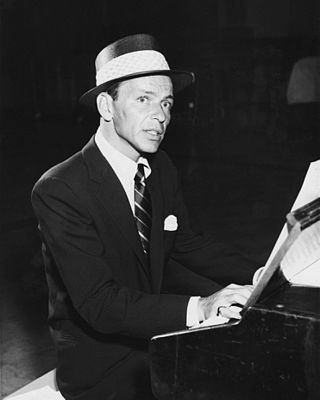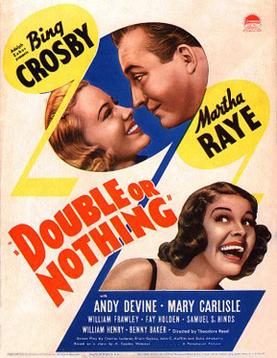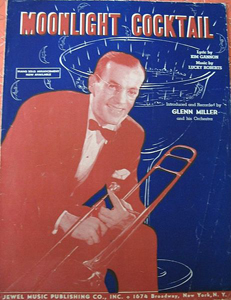Related Research Articles

This is a list of notable events in music that took place in the year 1937.

John Francis Burke was an American lyricist, successful and prolific between the 1920s and 1950s. His work is considered part of the Great American Songbook.

"Shine On, Harvest Moon" is a popular early-1900s song credited to the married vaudeville team Nora Bayes and Jack Norworth. It was one of a series of moon-related Tin Pan Alley songs of the era. The song was debuted by Bayes and Norworth in the Ziegfeld Follies of 1908 to great acclaim. It became a pop standard, and continues to be performed and recorded in the 21st century.

A Man and His Music is a 1965 double album by Frank Sinatra. It provides a brief retrospective of Sinatra's musical career. The album won the 1967 Grammy Award for Album of the Year.
"They Can't Take That Away from Me" is a 1937 popular song with music by George Gershwin and lyrics by Ira Gershwin. It was introduced by Fred Astaire in the 1937 film Shall We Dance and gained huge success.
"Have I Told You Lately That I Love You?" is a popular song written by Scotty Wiseman for the 1944 musical film, Sing, Neighbor, Sing and performed by Lulu Belle and Scotty. It was their greatest hit and one of the first country music songs to attract major attention in the pop music field. Although the song was featured in the movie, it was not released by Lulu Belle and Scotty until 1947. The first released version of this song was by Gene Autry in 1945.
"Without a Song" is a popular song composed by Vincent Youmans with lyrics later added by Billy Rose and Edward Eliscu, published in 1929. It was included in the musical play, Great Day. The play only ran for 36 performances but contained two songs which became famous, "Without a Song" and "Great Day".

The Complete Reprise Studio Recordings is a 1995 box set album by the American singer Frank Sinatra. The release coincided with Sinatra's 80th birthday celebration.
"The Gypsy in My Soul" is a popular song written for the 50th anniversary of the University of Pennsylvania Mask and Wig show in 1937 by two Penn graduates, Clay Boland and Moe Jaffe. Boland wrote the music and Jaffe the lyrics. Although both men had long since graduated, it had become the practice at the time for professionals, rather than students, to compose songs for the show.
"I've Got The World on a String" is a 1932 popular jazz song composed by Harold Arlen, with lyrics written by Ted Koehler. It was written for the twenty-first edition of the Cotton Club series which opened on October 23, 1932, the first of the Cotton Club Parades.

Bing Sings Whilst Bregman Swings was Bing Crosby's sixth LP, his first album for Verve, recorded and released in a mono format in 1956.
"Moonlight Becomes You" is a popular song composed by Jimmy Van Heusen with lyrics by Johnny Burke. The song was written for the Paramount Pictures release Road to Morocco (1942) and published in 1942 in connection with the film. Vic Schoen wrote the arrangement.
"I Wished on the Moon" is a song composed by Ralph Rainger, with lyrics by Dorothy Parker. Bing Crosby sang the song in The Big Broadcast of 1936.

Frank Sinatra's musical career began in the swing era in 1935, and ended in 1995, although he did briefly retire in 1971, before returning to music in 1973. Sinatra is one of the most influential music artists of the 20th century, and has sold 150 million records worldwide, making him one of the best-selling music artists of all-time. Rock critic Robert Christgau called Sinatra "the greatest singer of the 20th century". In addition to his music career, Sinatra was also a successful film actor, having won the Academy Award for Best Supporting Actor for his role as Private Angelo Maggio in From Here to Eternity (1953).
"Change Partners" is a popular song written by Irving Berlin for the 1938 film Carefree, in which it was introduced by Fred Astaire. The song was nominated for an Academy Award for Best Original Song in 1938, but lost out to "Thanks for the Memory."
"Reaching for the Moon" is a popular song written by Irving Berlin for the 1930 musical film of the same name.

Double or Nothing is a 1937 American musical comedy film directed by Theodore Reed and starring Bing Crosby, Martha Raye, Andy Devine, Mary Carlisle and William Frawley. Based on a story by M. Coates Webster, the film is about a dying millionaire who instructs his lawyer to drop twenty-five purses on the streets of New York City, which are found and returned by four honest people. According to the will, each of them is given five thousand dollars, which they must double within thirty days in order to claim one million dollars. Greedy relatives, who were cut from the will, try to thwart each one's plans. The film features the popular song "The Moon Got in My Eyes".
"We'll Be Together Again" is a 1945 popular song composed by Carl T. Fischer, with lyrics by Frankie Laine.

"Moonlight Cocktail" is a 1941 big band song recorded by Glenn Miller during World War II. The music was composed by Luckey Roberts and the lyrics by Kim Gannon.

After Bing Crosby's long-term Decca Records contract was up, he signed many short-term contracts with a wide variety of labels. These included many popular labels such as Reprise, RCA, Verve, Decca (again), United Artists, Capitol and more.
References
- ↑ Stanley Green, Elaine Schmidt (1999). Hollywood musicals year by year. H. Leonard Corporation. p. 72. ISBN 9780634007651.
- 1 2 "The Moon Got In My Eyes". Secondhandsongs.com. Retrieved 25 June 2024.
- ↑ Holbrook, Morris (2012). Music, Movies, Meanings, and Markets - Cinemajazzamatazz. Taylor & Francis. p. 92. ISBN 9781136715761.
- ↑ "By Myself by Banu Gibson". Secondhandsongs.com. Retrieved 25 June 2024.